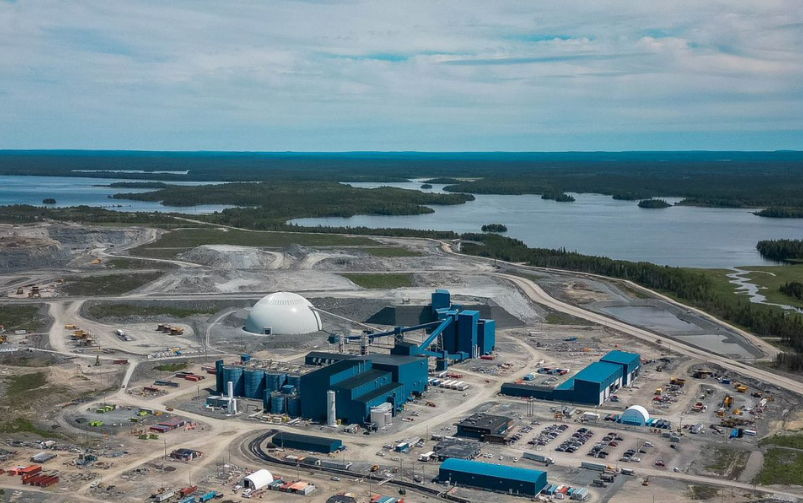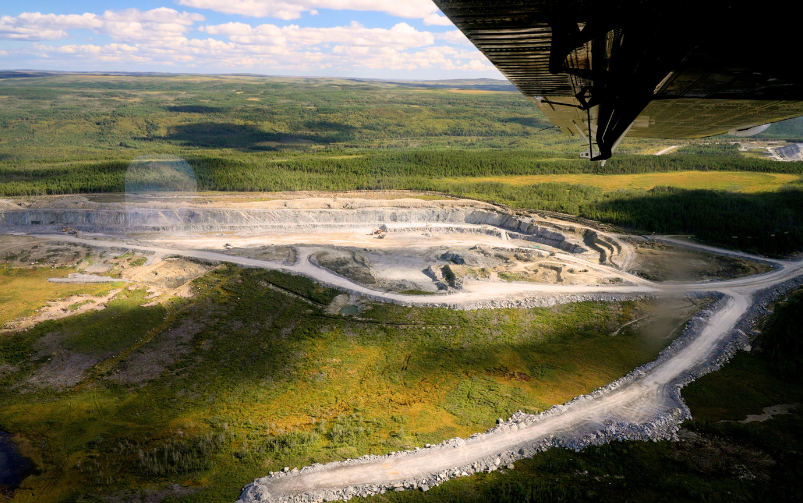(Left to right) Moderator Robin Stickley, with panelists Freda Campbell, Phillips S. Baker, Jr., Ali Pejman, Jason Sangha. Photo: Jon Benjamin Photography
The 2024 edition of CIM Connect kicked off with its opening plenary session, held on May 13, which zoned in on Canada’s critical advantage in the global energy transition. Outgoing CIM president Michael Cinnamond briefly took the stage to introduce CIM’s new brand identity before introducing award-winning journalist Robin Stickley as the moderator of the morning panel session.
Stickley welcomed to the stage Freda Campbell, independent engagement & training professional, Phillips S. Baker, Jr., president and chief executive officer of Hecla Mining Company, Ali Pejman, partner of investment banking with Fort Capital, and Jason Sangha, vice-president, planning and strategy for Teck Resources’ base metals division.
Stickley initiated conversations between the four panelists by sharing a quotation from Jonathan Wilkinson, Canada’s energy and natural resources minister, that he said upon the launch of the critical minerals strategy in December 2022, “we have to go faster. It cannot take us 12 to 15 years to permit new mines in Canada if we’re going to advance the energy transition.” Stickley asked the panel how balance could be achieved when it comes to addressing the demand for critical minerals without increasing risks to some crucial areas, such as relationships with First Nations communities.
Campbell pointed out the importance of mining companies and other stakeholders seeking to build genuine relationships with Indigenous communities and engaging in meaningful collaboration. Despite the push to meet this demand, Campbell noted that “relationship building with Indigenous nations needs time” and is something that should not be rushed.
Sangha reiterated the importance of Campbell’s view, adding that there needs to be balance between speeding up the mine permitting process while also forging non-transactional relationships with Indigenous nations.
Baker agreed that permitting times need to be sped up but recognized that Canada’s process is still significantly better than the permitting process in the United States, which he considers to be “broken” and often “driven by litigation.”
When conversations turned over to investment in Canada’s resources, Pejman pointed to Australia as a key example of a country that has a broader investment ecosystem to support mining. “Australia has a very strong community of investors,” he said.
A question raised by an audience member, which asked why the permitting process should be sped up, pointing out that “we’re better at destroying the land than reclaiming it,” was met with mixed reactions from the panelists. Baker denied this viewpoint, claiming that Canada has been “remarkable” with some of its reclamation efforts. “This is a perception, it’s not the reality,” he said, calling those who believe this to be “uninformed.”
Sangha built off Baker’s point, noting that this perception is not reflective of the reality of today’s mining industry. “I think if people were to have more visibility into the effort that companies are putting into not only protecting the land, but also to diversify nature...and how we are working with Indigenous communities to work through some of these challenges, it’s a pretty significant pendulum shift over the last 20 to 30 years,” he said. Sangha offered an example of how mine reclamation efforts are improving, highlighting Teck Resources’ Nature Positive initiative. The main goal of this initiative is to conserve or rehabilitate at least three hectares of land for every one hectare that is affected by the company’s mining activities.
Pejman mentioned that there are some positive stories that have not been reported in the mainstream media, for example about reclamation efforts at mine sites or how mining has positively impacted communities. “They’re great stories, but they don’t get out there,” he said. “We’re in an uphill battle [when it comes to] the perception of mining. I don’t think we brag about it much, and I just don’t see enough of a campaign about how good mining is.” Pejman added that the media tends to focus its attention on negative situations in the mining industry, such as environmental disasters.
The focus turned to Canada’s advantage when compared with other mining countries, specifically concerning critical minerals. Baker considers Canada to have considerable advantages in this regard, such as its stable government and vast supply of critical minerals. He briefly contrasted Canada’s mining opportunities with Mexico’s, calling attention to Mexico’s recent proposed ban on open-pit mining, which has halted some of the country’s mining projects.
Sangha agreed with Baker’s view on Canada’s stability compared with other countries. “We have some of that broader stability, which we may take for granted in the Canadian context of how difficult it can be in some of these other places in the world where you’re trying to develop a project and move it forward,” he said. “Sometimes we think that everybody operates the way we do in North America, but that’s not the case.”
Campbell followed up by focusing on some areas that Canada can improve on if the country wants to maintain this advantage. A key improvement Campbell suggested was to take advantage of the diverse technical skillset of the local Indigenous workers and students.
The final half hour of the discussion returned to the theme of perceptions of mining, and how the industry could continue to improve its reputation. Sangha advocated not only for more Indigenous involvement in the industry, but also called for increased gender diversity. “In Canada, we’ve made some pretty big strides [in gender diversity] over the last decade or so, but there’s still so much more we can do.” Campbell briefly touched on her own experience as an Indigenous woman in mining, sharing that when she first entered the industry, she was told that women “don’t belong in mining.”
Another crucial step in changing perceptions of the industry that was explored during the session was advocating for and discussing mining with people outside of the industry. Sangha drew attention to the fact that these conversations need to happen with people who may not be familiar with the industry so that they can understand how big of a role mining plays in our everyday lives. This “disconnect” that is observed between people’s reliance on mining and the perception of the industry needs to be continually addressed, especially now, as the country participates in the global energy shift.
The session came to a close with one final question: what has been the biggest mistake in the mining industry over the last 20 years? Baker considers Canadian-owned companies getting “gobbled up” by international companies to be a significant mistake but added that corporate governance rules have changed over the last few years, which makes it more difficult for international giants to take over Canadian companies today. Pejman agreed with this, adding that losing some of these companies affected the country’s investment ecosystem.
Closing on a hopeful note, the panelists shared some aspirations for the future of mining in Canada, which included Campbell’s hope of seeing continuous Indigenous involvement and collaboration in mining, and Sangha would like to see more people and companies showcase the value that mining brings to society.




